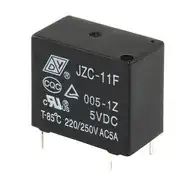Hi I want my circuit to be able to switch on and off several 230V AC circuits. I was wondering if relays are my only option. It starts to get a bit expensive if you need a few. Originally I was going to use a 5V dc relay to switch the devices on and off
-
Similar to a relay but typically for higher power/current is a contactor http://en.wikipedia.org/wiki/Contactor – kenny Apr 04 '11 at 17:13
-
I asked a similar question here: http://electronics.stackexchange.com/questions/16872/what-would-be-the-most-suitable-components-to-replace-some-relays - What would be the most suitable components to replace some relays? – m.Alin Sep 06 '11 at 17:49
5 Answers
You may find relays with a 12 or 24V coil cheaper. You may consider triacs (thyristors) but it is hard to beat the price (and simplicity) of a relay.
- 5,302
- 1
- 25
- 45
-
1@Ageis, using a higher than 5V coil will mean using a transistor to switch the relay. Also relays are isolated between the contacts and the coil, but triacs are not in themselves isolated so you need a layer of isolation such as an auxillary opto triac or opto isolator. Depending on the load you are driving, relays may be more reliable. – Martin Apr 04 '11 at 16:08
-
It it's being driven from microcontroller, he would need extra transistors anyway... – BarsMonster Apr 04 '11 at 16:14
-
-
1@kenny, easily. Look for a relay with safety agency approvals. A quick search found this one with 4 kilovolts of isolation between coil and contacts. – Martin Apr 04 '11 at 19:43
-
@kenny Why DC relays? The OP is explicitly asking for AC. Maybe add a new question about relays for switching DC loads with high isolation voltage. – jpc Apr 04 '11 at 21:00
-
@jpc When you suggest 12 or 24 volt relays, I assumed you mean DC ones otherwise I thought you would have said 230 volt AC relays. – kenny Apr 04 '11 at 21:21
-
-
@jpc: Why DC relays? because the original poster wanted to drive the coil with DC. My understanding is that a relay designed so the coil is driven by DC and the contacts carry 230 VAC is a "DC relay" – davidcary Sep 07 '11 at 23:04
-
@davidcary: I believe kenny and Martin both assumed a "DC relay" means a relay that is designed for switching DC loads (i.e. automotive)... Probably because relays with AC coils are quite uncommon in electronics. – jpc Sep 08 '11 at 01:15
If you need fast switching (up to 50-60Hz), you can take a look at solid state relays. They don't produce a "click" like mechanical ones, but this feature comes with a price...
- 1,872
- 3
- 14
- 21
I just purchased several SPDT 5V relays from SparkFun the other day, and they're working very well for me. They're rated for a maximum of 5A at 250VAC or 30VDC and only cost $1.95/relay.

If the devices you're switching are pulling more than 5A, they also have 30A SPST relays for $4 each.
- 303
- 2
- 9
I'm afraid there are few other options than relays, esp. if you want electrical insulation between your circuit and the 230V side.
You don't give details about the kind of load you want to switch, but the cheapest >2A electromechanical relay I found at Digikey is the Omron G5T, which sells for USD 1.27 quantity one. This can switch 5A @ 250V AC, but you may have to derate it if your load is reactive (capacitive or inductive).
A solid state relay (SSR) is an alternative, but SSR modules tend to be expensive. For low currents (~1A) there are affordable SSRs, however, this one costs USD 1.38. An SSR for minimum 5A will already cost you three times as much, so there the electromechanical relay is pretty much the cheapest solution.
Keep in mind that for both electromechanical and solid state relays a few extra components are required, but they won't cost that much.
- 145,832
- 21
- 457
- 668
By far, the most common silicon device to drive AC loads connected to mains voltage is the triac, according to ST app note AN3169,
Even including the other things required to get it to work reliably (typically an optoisolator and a RC snubber), the total parts cost is usually less than a relay.
Alas, getting it to work reliably is complicated. If you're going to use less than 20 of the things, I'd stick with easy-to-use solid-state relays (the easy-to-use package usually includes a triac plus those other things I mentioned) or an easy-to-use mechanical relay -- it's not worth tearing your hair out to save a couple of bucks :-).